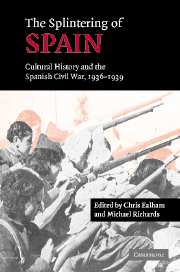Book contents
- Frontmatter
- Contents
- List of illustrations
- List of maps
- List of contributors
- Preface
- List of abbreviations
- Chronology
- Maps showing the division of Spain, 1936-1939
- 1 History, memory and the Spanish civil war: recent perspectives
- Part I Overviews: violence, nationalism and religion
- Part II Republican political and cultural projects
- 5 Catalan populism in the Spanish civil war
- 6 The myth of the maddened crowd: class, culture and space in the revolutionary urbanist project in Barcelona, 1936–1937
- 7 The culture of empowerment in Gijón, 1936–1937
- Part III Identities on the Francoist side
- Notes
- Index
6 - The myth of the maddened crowd: class, culture and space in the revolutionary urbanist project in Barcelona, 1936–1937
Published online by Cambridge University Press: 28 July 2009
- Frontmatter
- Contents
- List of illustrations
- List of maps
- List of contributors
- Preface
- List of abbreviations
- Chronology
- Maps showing the division of Spain, 1936-1939
- 1 History, memory and the Spanish civil war: recent perspectives
- Part I Overviews: violence, nationalism and religion
- Part II Republican political and cultural projects
- 5 Catalan populism in the Spanish civil war
- 6 The myth of the maddened crowd: class, culture and space in the revolutionary urbanist project in Barcelona, 1936–1937
- 7 The culture of empowerment in Gijón, 1936–1937
- Part III Identities on the Francoist side
- Notes
- Index
Summary
As if vomited out of a hellish cavern, they spring forth everywhere: the most terrifying-looking whores, the former men [ex-hombres] who drown their failure with the explosive alcohol of the taverns, the wrongdoers who aggravate and profit from every chaotic situation, subhuman beings full of psychopathic defects and resentments against society. This mad and maddening humanity, which ordinarily lives hidden from and extraneous to the city, only comes into the light of day in moments of profound revolutionary upheaval and only then can its terrifying size be witnessed.'
Authorities and thoughtless historians commonly describe popular contention as disorderly… But the more closely we look at that same contention, the more we discover order. We discover order created by the rooting of collective action in the routines and organisation of everyday social life, and by its involvement in a continuous process of signalling, negotiation, and struggle with other parties whose interests the collective action touches.
In this chapter I examine the socio-temporal, symbolic, practical and spatial aspects of revolutionary urbanism in Barcelona and how these were structured and inflected by the experience of past class struggles and by the sediments of culture, communal belief and ideology that had developed in the barrios during the preceding 100 years. While revolutionary urbanism was theorised and formally articulated by the main revolutionary organisations (the anarcho-syndicalist CNT, the anarchist FAI and the dissident-communist POUM) in the course of their struggle for the democratisation of social life, on another level it grew spontaneously from the cultural politics of the barrios and was shaped by a series of cultural frames of reference that enabled a strong working-class identity to be expressed, a perception of ‘proletarian Barcelona’ as a moral, social, geographical and aesthetic entity.
- Type
- Chapter
- Information
- The Splintering of SpainCultural History and the Spanish Civil War, 1936–1939, pp. 111 - 132Publisher: Cambridge University PressPrint publication year: 2005
- 2
- Cited by



